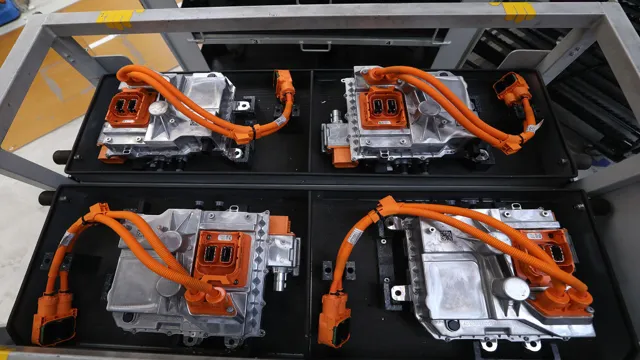Saving Green: The Ultimate Guide to Calculating and Minimizing Electric Car Battery Charge Costs
Electric cars have grown in popularity in recent years due to their environmentally-friendly nature and cost efficiency. While the upfront cost of an electric car may seem daunting, the long-term benefits often outweigh the investment. One key factor to consider when owning an electric car is the battery charge cost.
The cost to charge an electric car can vary depending on the type of charger used, the location of the charging station, and the time of use. In this blog, we will explore the factors that contribute to the cost of charging an electric car and provide tips on how to save money on battery charge costs. So, if you’re an environmentally-conscious driver or curious about electric cars, read on to learn more about this exciting technology.
Why Electric Cars Are Cheaper to Charge Than Gas Cars
One of the biggest advantages of owning an electric car is that it’s significantly cheaper to charge the battery compared to filling up a gas tank. The cost of electricity per mile driven by an EV is much lower than that of gasoline-powered cars because of the inherent differences in fuel sources and engines. Most EV drivers spend around $500 to $700 per year on charging their vehicles, while gasoline-powered car owners can easily spend upwards of $1,500 or more.
Electric cars can also benefit from reduced energy consumption during off-peak hours, when electricity prices are lower. This economic efficiency not only saves drivers money, but it can also be a significant factor in reducing overall greenhouse gas emissions and promoting a more sustainable future.
Comparing Average Cost of Electricity and Gasoline Per Mile Driven
Electric Cars Cheaper to Charge Than Gas Cars When it comes to comparing the cost of electricity and gasoline per mile driven, electric cars are undoubtedly cheaper to charge than gas cars. The average cost of electricity per kWh is significantly lower than the cost of a gallon of gasoline. It is because an electric car can go further on one charge than the amount of gas you get per gallon, and you can charge an electric vehicle at home, which reduces the cost of fueling the car.
If you’re looking for an affordable way to get around, then you should consider buying an electric car. Not only are electric cars cheaper to charge, but they’re also eco-friendly and release far fewer emissions than gas cars. So, if you want to save money and help the environment, then an electric car is the way to go.
Factors that Affect the Cost of Charging an Electric Car
When it comes to fueling your car, it’s no secret that gas prices can put a dent in your wallet. Fortunately, electric cars are becoming more popular and are cheaper to charge than gas cars. There are several factors that affect the cost of charging an electric car, including electricity rates, the type of charger used, and the size of the car’s battery.
Overall, electric cars are more efficient and require less maintenance than gas cars, making them a more cost-effective option in the long run. Plus, with the increasing number of charging stations and the convenience of charging at home, electric cars are becoming even more practical for daily use. If you’re looking to save money on fuel costs, an electric car may be the way to go.
Calculating the Cost of Charging an Electric Car
If you’re thinking about buying an electric car, one important factor to consider is the cost of charging the car’s battery. The good news is that, in general, electric cars are cheaper to recharge than gasoline cars are to refuel. The average cost per kilowatt-hour in the United States is currently around 13 cents, meaning it would cost around $11 to fully charge a Tesla Model 3 with a 60 kWh battery.
However, the actual cost of charging an electric car battery can vary depending on a number of factors, including the size of the battery, the cost of electricity in your area, and the charging method you use. For example, charging at home overnight will typically be cheaper than using public charging stations during the day. Additionally, some electricity providers offer lower rates for overnight charging, which can further reduce your costs.
Overall, while the cost of charging an electric car battery may sound expensive upfront, it can end up saving you money in the long run, especially if you’re able to take advantage of discount rates and have access to cheap, renewable energy sources.
Using Home Electricity Rates
When it comes to electric cars, one of the most important factors to consider is the cost of charging them at home. To determine this cost, you need to know your home electricity rate. This rate is what your utility company charges for electricity usage and can vary based on the time of day, season, and location.
Knowing this rate can help you calculate the cost of charging your electric car overnight or during peak hours. Additionally, some utility companies offer special electric vehicle rates, which can also affect the cost of charging. By understanding your home electricity rates and factoring them into your electric car charging habits, you can better manage your energy usage and save money on your monthly bills.
Public Charging Station Costs
Calculating the cost of charging an electric car at a public charging station can be a bit tricky, but it’s important to know the costs so you can plan your trips and budget accordingly. Most public charging stations will have a flat rate or a fee based on the amount of time you spend charging your vehicle. However, some charging stations might offer a rate based on the amount of energy you use.
It’s important to check the pricing structure at each charging station you plan to use so you can calculate what your charging costs might be. One way to estimate your costs is to check your vehicle’s battery capacity and the estimated cost per kilowatt-hour (kWh) at the charging station. For example, if your electric car has a battery capacity of 60 kWh and the charging station costs $0.
20 per kWh, then it would cost you around $12 to fully charge your vehicle. Keep in mind that the actual cost might be slightly higher or lower depending on the efficiency of your vehicle and the charging station.
Level 1 vs Level 2 Charging Costs
Calculating the cost of electric car charging can be confusing, especially when trying to compare Level 1 and Level 2 charging costs. Level 1 charging typically uses a standard 120-volt household outlet, which can provide up to 4 miles of range per hour of charging. On the other hand, Level 2 charging uses a 240-volt outlet and can provide up to 25 miles of range per hour of charging.
While Level 1 charging is slower, it is also less expensive as it usually costs around $0.12-$0.16 per kWh.
Level 2 charging, on the other hand, is faster but more expensive, usually costing around $0.20-$0.30 per kWh.
To determine the exact cost of charging an electric car, it is important to consider the price of electricity in your area and the efficiency of your electric vehicle. Additionally, some charging stations may offer different pricing plans, so it’s worth shopping around to find the best deal for you.
Saving Money with Electric Cars and Charging
One of the biggest advantages of driving an electric vehicle is the cost savings associated with charging its battery. The cost of charging an electric car battery varies, but it is generally much cheaper than buying gasoline. On average, charging an electric vehicle can cost between $0.
10 and $0.20 per kilowatt-hour (kWh). A typical electric car battery has a capacity of around 60 kWh.
This means that a full charge would cost between $00 and $100, depending on the price of electricity in your area.
Charging an electric car battery at home is even cheaper, as you can take advantage of off-peak electricity rates and avoid expensive public charging stations. Overall, electric cars can save you a significant amount of money on fuel costs, and you can feel good about reducing your carbon footprint at the same time.
Federal and State Electric Vehicle Tax Credits
Electric vehicles have gained immense popularity in recent years, and for all the right reasons. One of the biggest advantages of owning an electric vehicle (EV) is the cost savings. With federal and state tax credits available, buying an EV is now more affordable than ever before.
The federal tax credit can provide up to $7,500 in savings, while state incentives can add even more to your pocket. For example, in California, buyers can receive a rebate of up to $2,000 per vehicle. Furthermore, EV owners can also benefit from significantly lower fuel and maintenance costs than traditional gas-powered vehicles.
With all these savings, it’s no wonder that more and more people are turning to electric cars and charging stations. So, if you want to save money in the long run while also reducing greenhouse gas emissions and doing your part to protect the environment, buying an electric car may be the perfect choice for you.
Reduced Maintenance Costs for Electric Cars
Electric cars have numerous benefits, including reduced maintenance costs. As electric vehicles have fewer moving parts than their gasoline counterparts, the maintenance requirements are significantly lower. For instance, electric cars don’t need oil changes, spark plug replacements, or other traditional engine maintenance tasks that can add up to hefty bills over time.
Instead, EV owners can benefit from less expensive battery replacements, tire rotations, and brake pad replacements. Not only that, but electric cars are also more energy-efficient than gas-powered vehicles, which means they require less fuel or charging, resulting in even more savings. Evidently, electric cars allow drivers to save money in the long run, making them an excellent option for anyone looking to reduce their overall car costs.
Conclusion: The Cost Benefits of Electric Car Charging
In the world of electrified transportation, the cost of a battery charge can have a profound impact on the overall economics of owning and operating an electric vehicle. But fear not, for with the right tools and resources, EV drivers can easily navigate the complex landscape of charging costs and find the most affordable and convenient options available. So whether you’re zipping around town in a sleek new Tesla or cruising the highways in a trusty old Leaf, always remember: when it comes to electric car battery charge cost, knowledge is power!”
FAQs
How much does it cost to charge an electric car battery?
The cost of charging an electric car battery depends on the electricity rates in your area and the capacity of your vehicle’s battery. On average, it costs around $0.13 to $0.21 per kWh to charge an electric vehicle.
How long does it take to fully charge an electric car battery?
The charging time for an electric car battery depends on the capacity of the battery and the charging speed of the charging station. In general, it can take anywhere from 30 minutes to several hours to fully charge an electric car battery.
Are public charging stations available for electric cars?
Yes, there are many public charging stations available for electric cars, and their numbers are increasing rapidly. You can find public charging stations at shopping centers, parking lots, hotels, and other public places.
How long does an electric car battery last before it needs replacement?
The lifespan of an electric car battery depends on many factors, such as the vehicle’s usage pattern, driving conditions, and maintenance. In general, electric car batteries can last anywhere from 8 to 10 years, but some batteries can last up to 15 years with proper care and maintenance.





